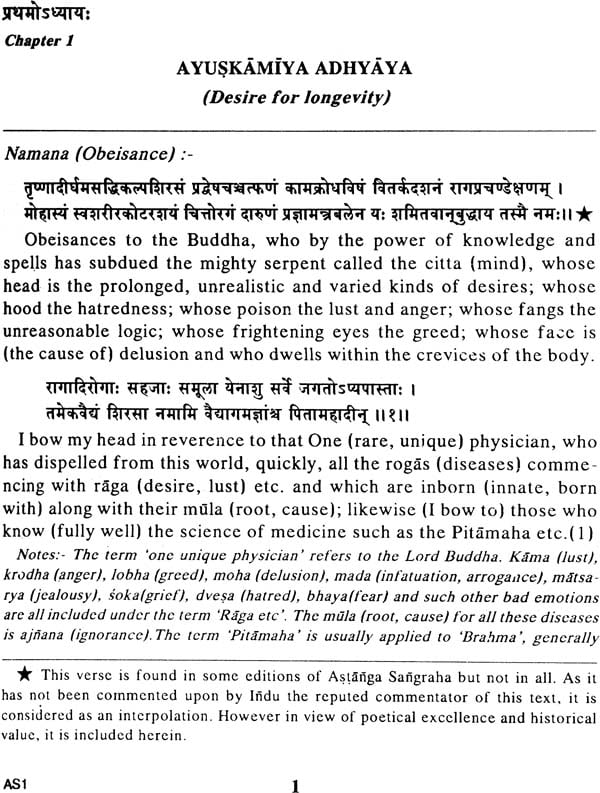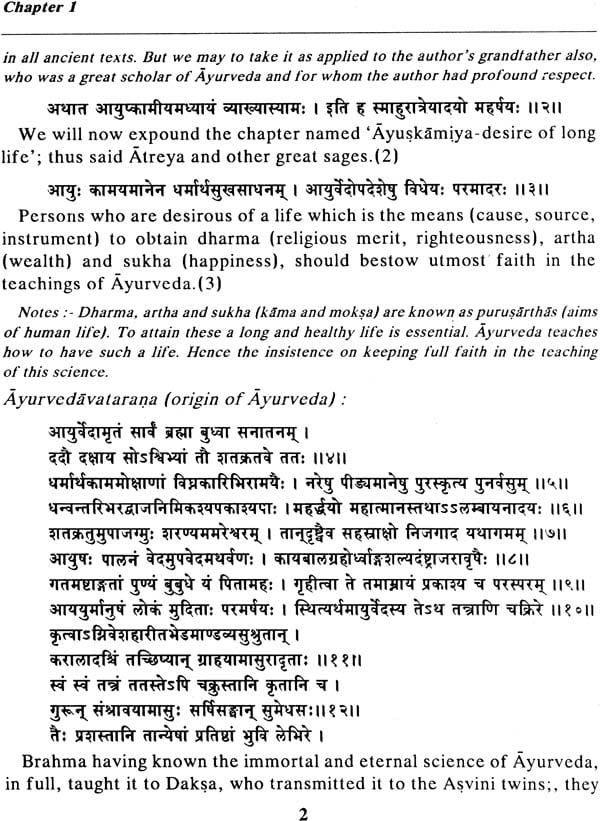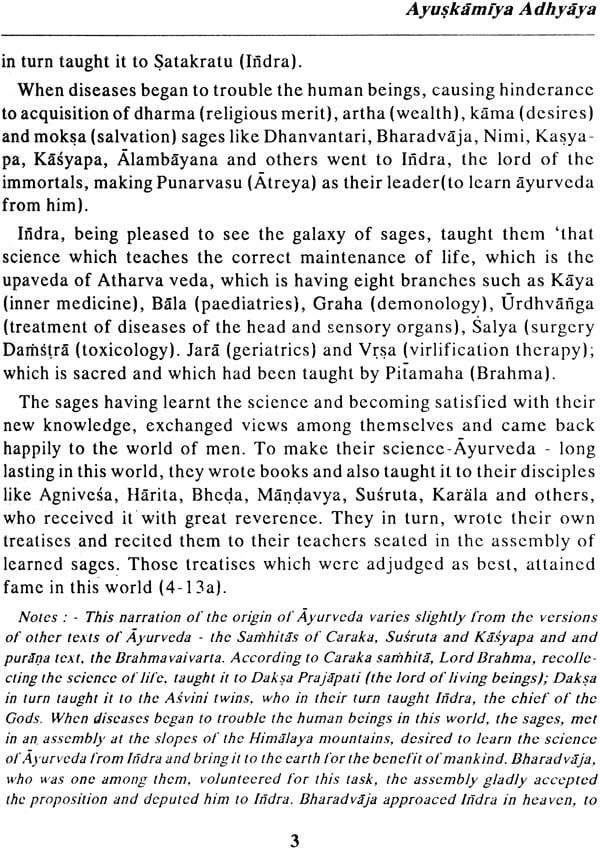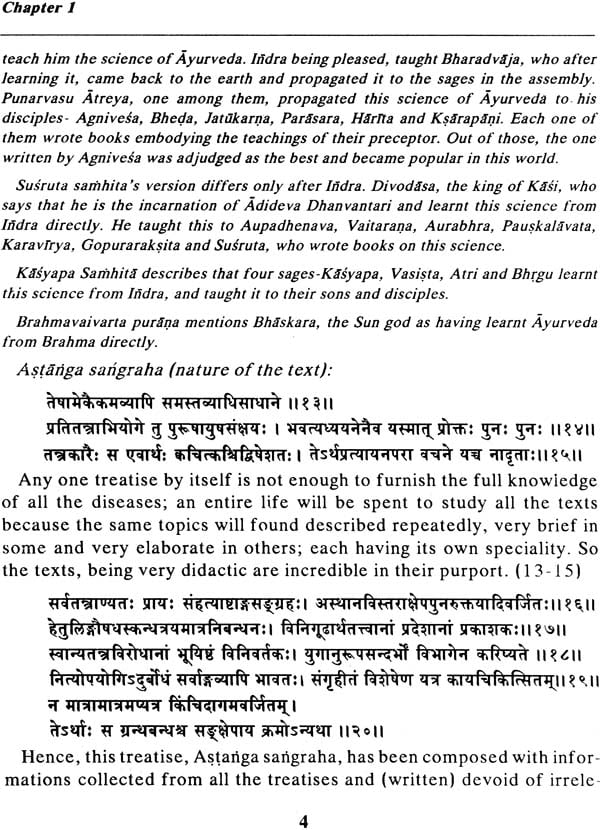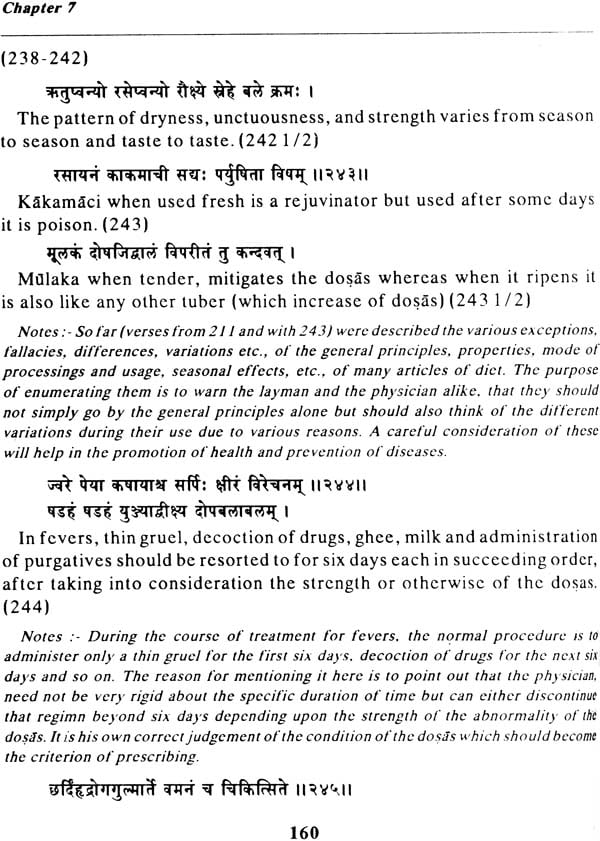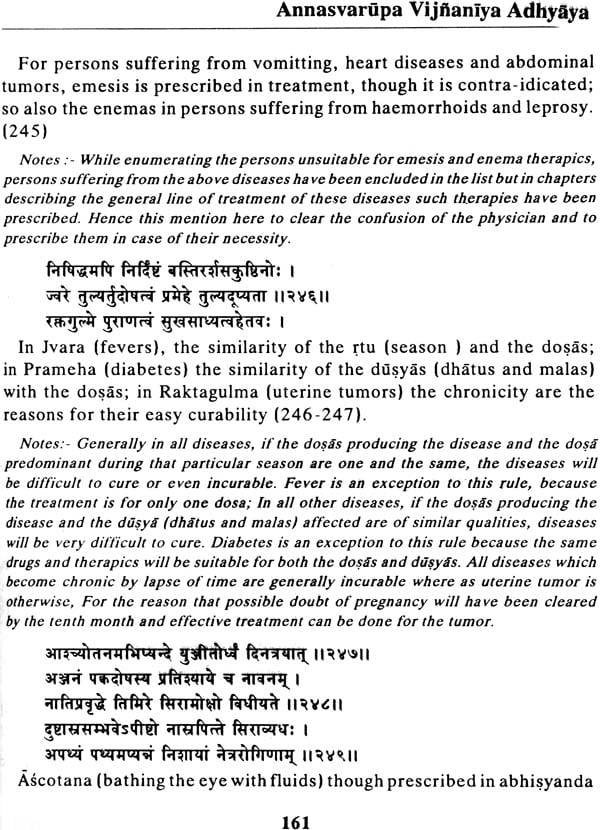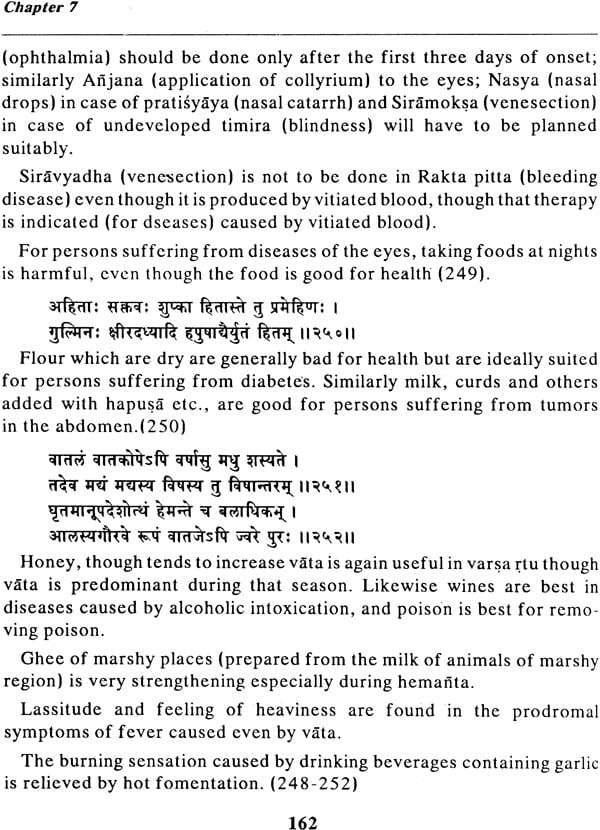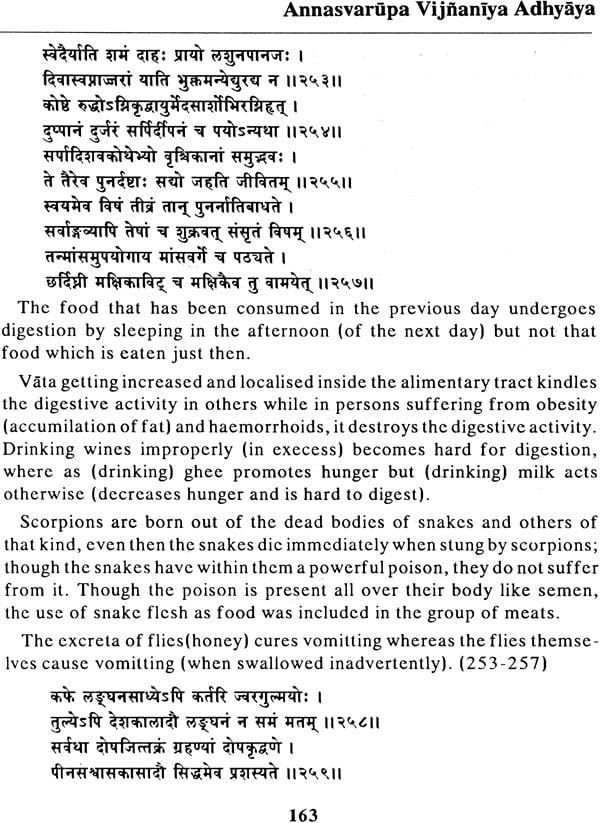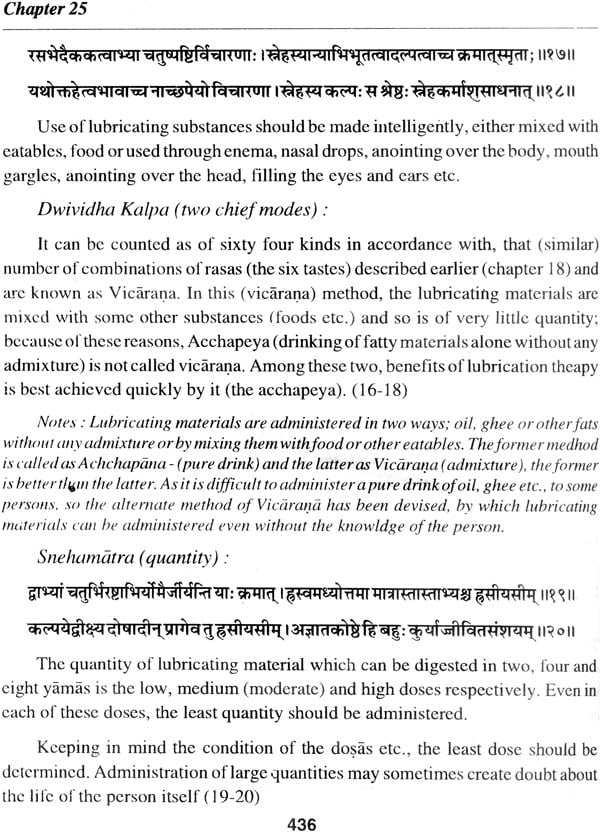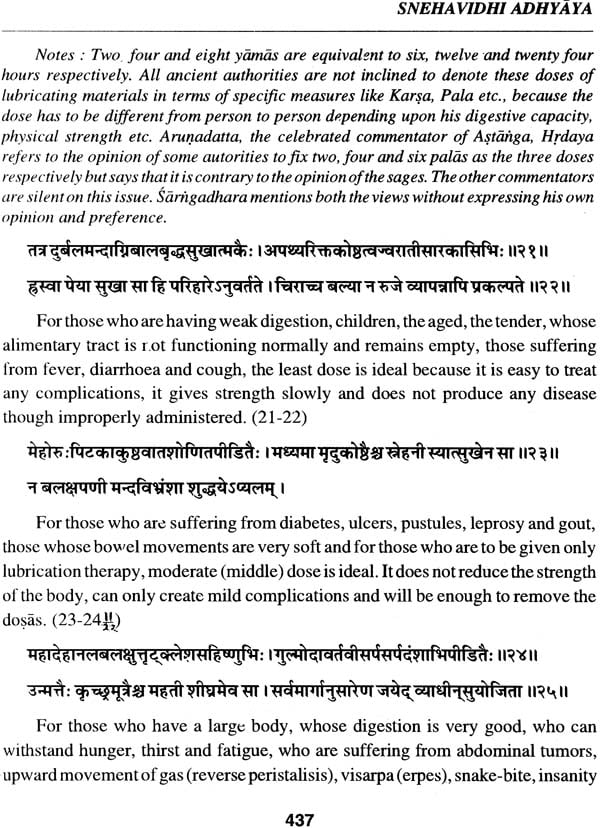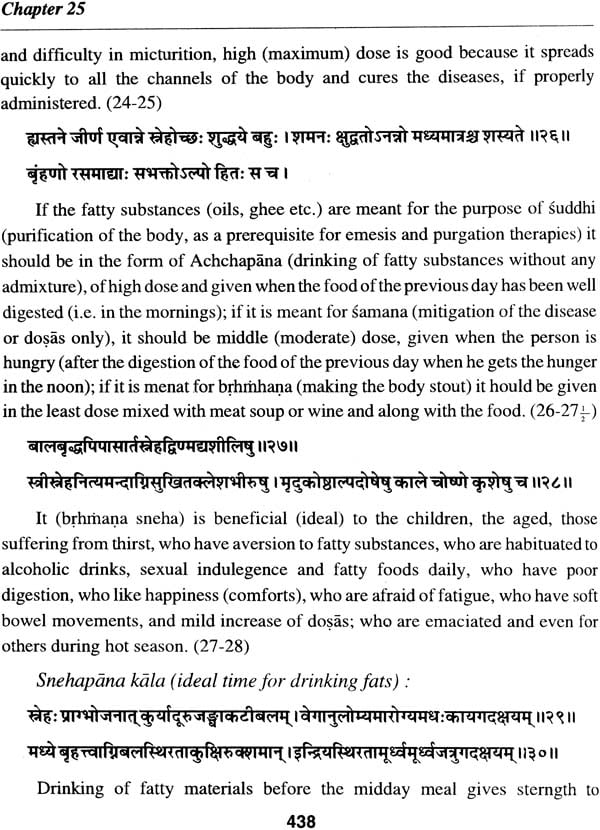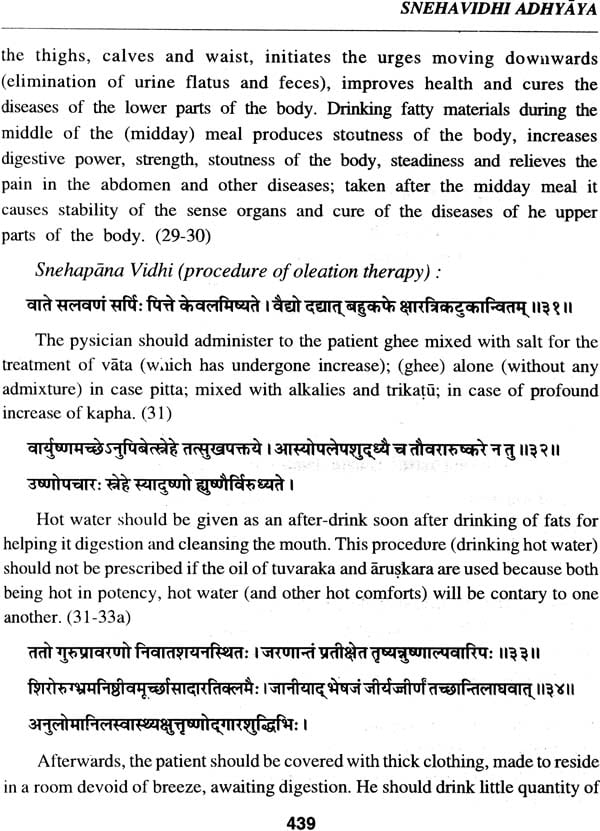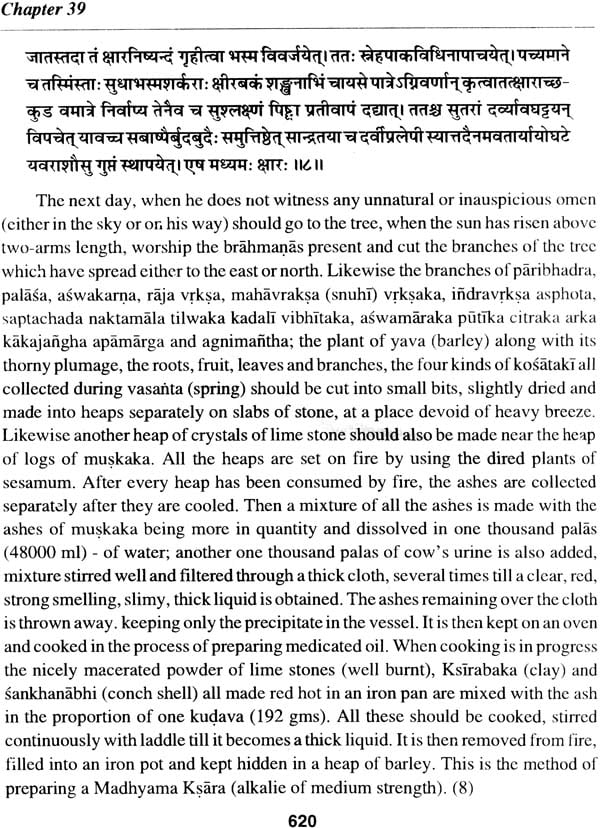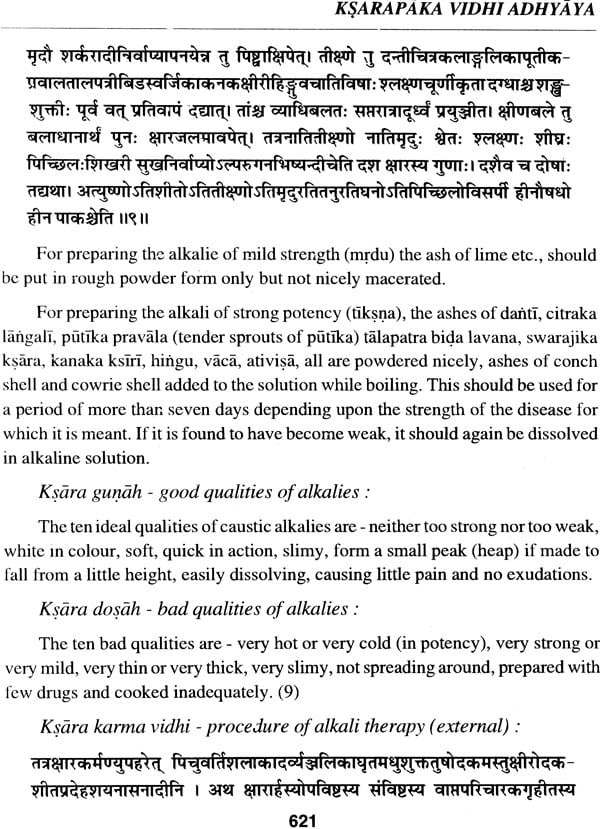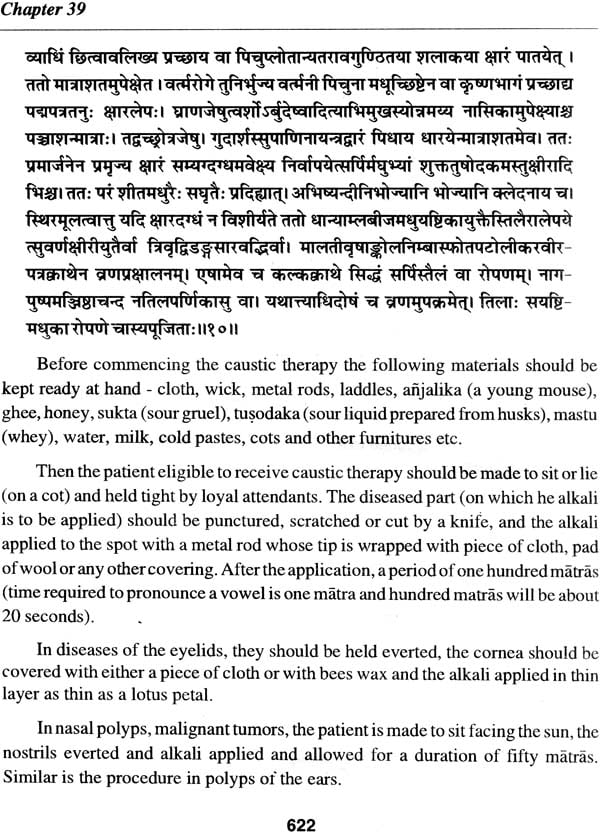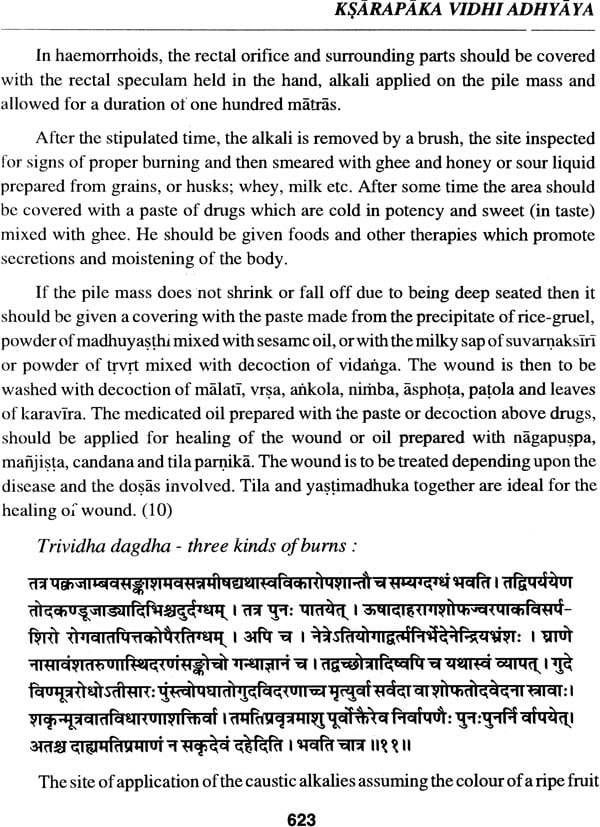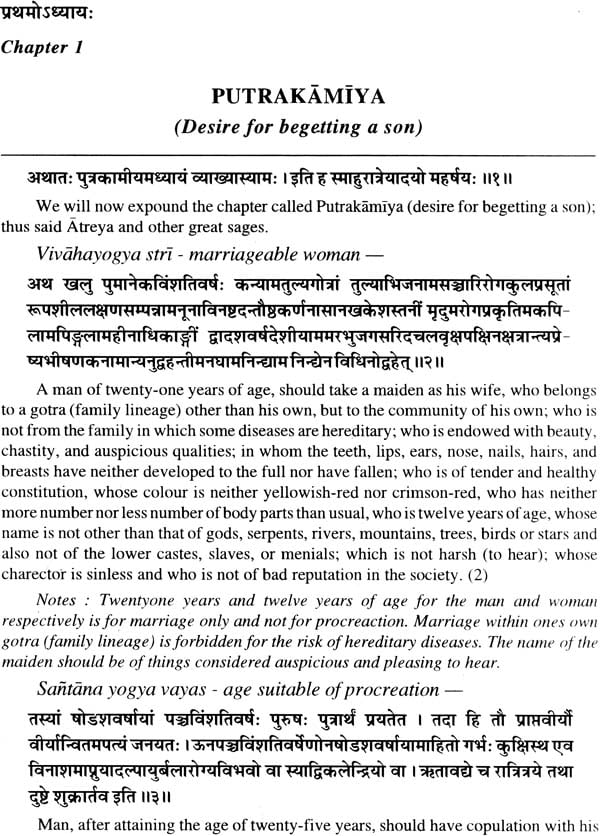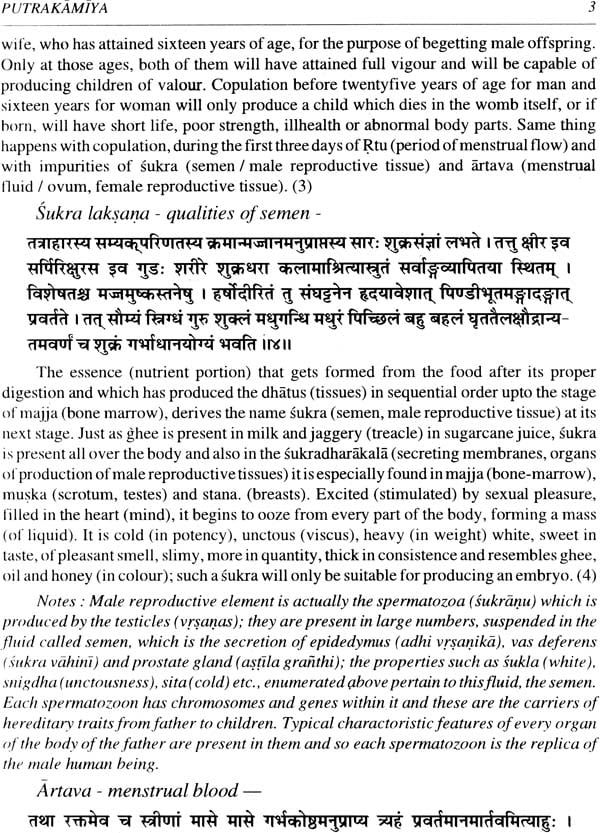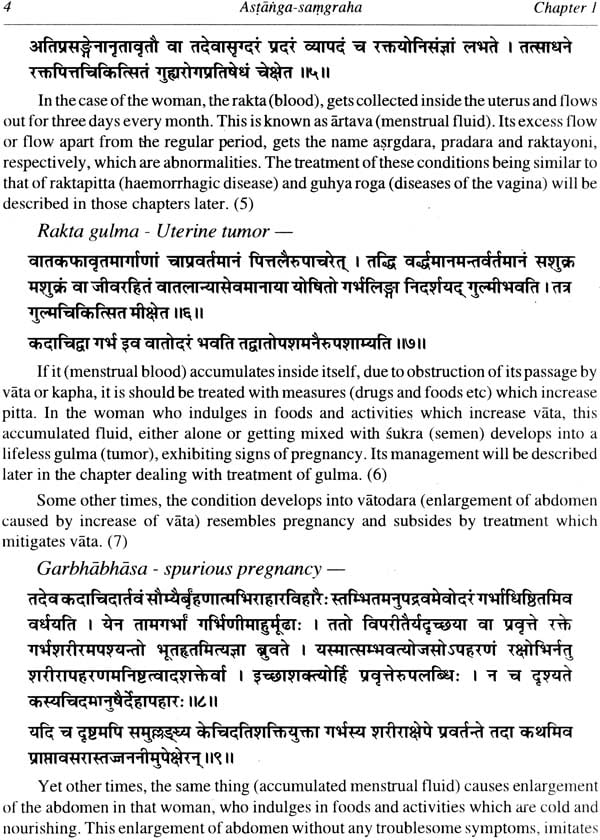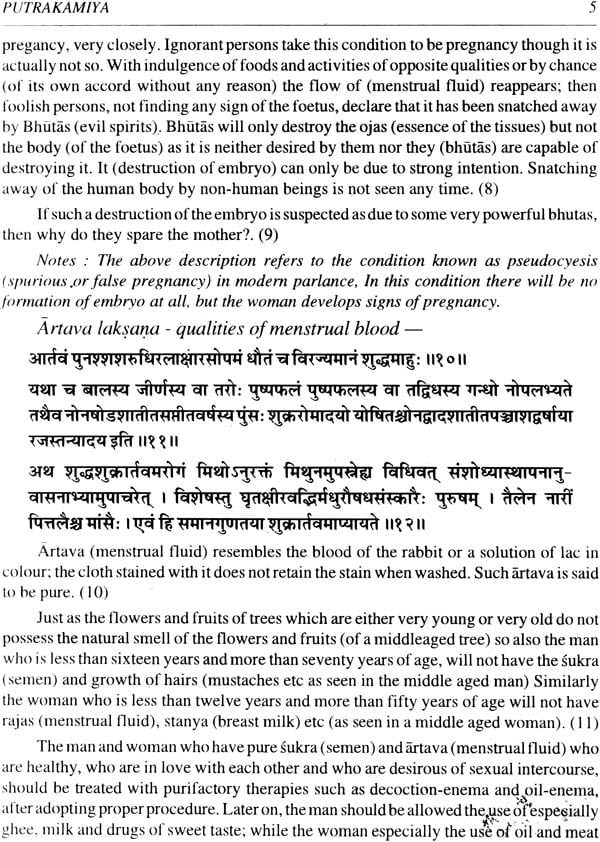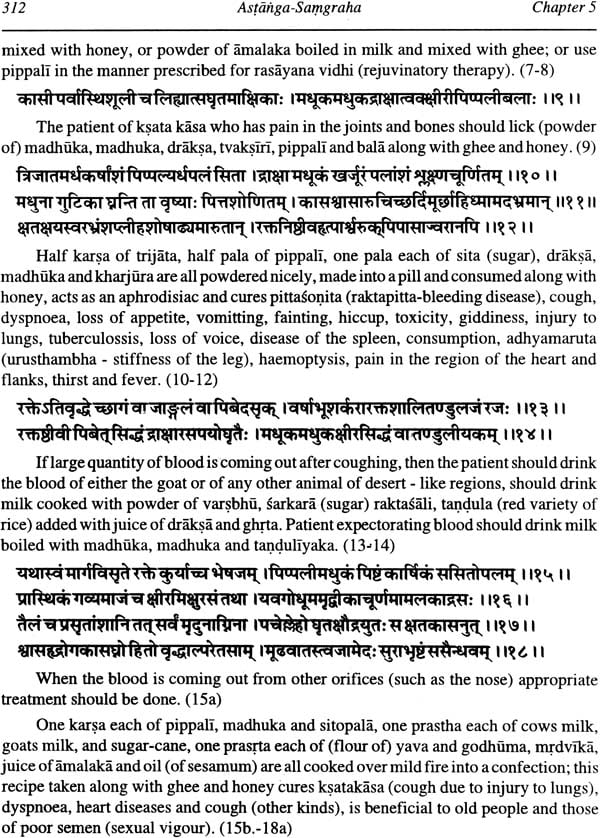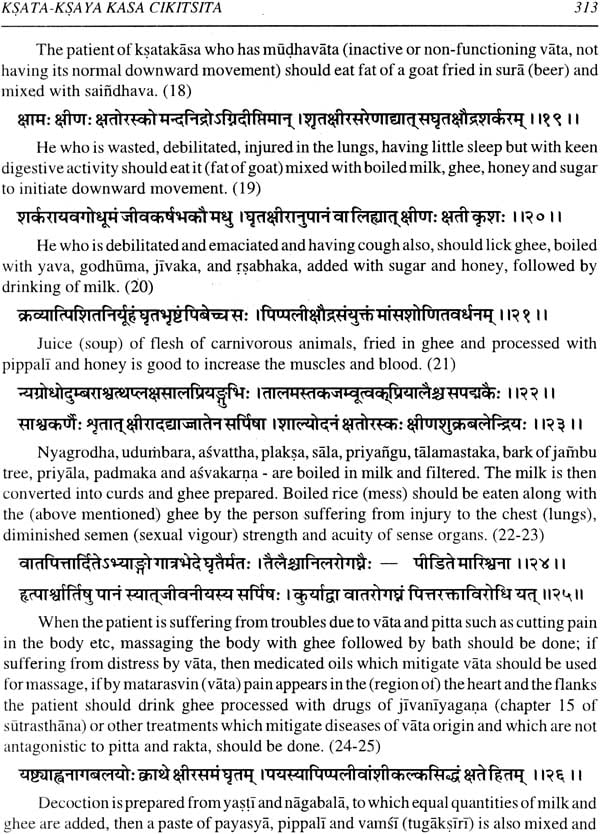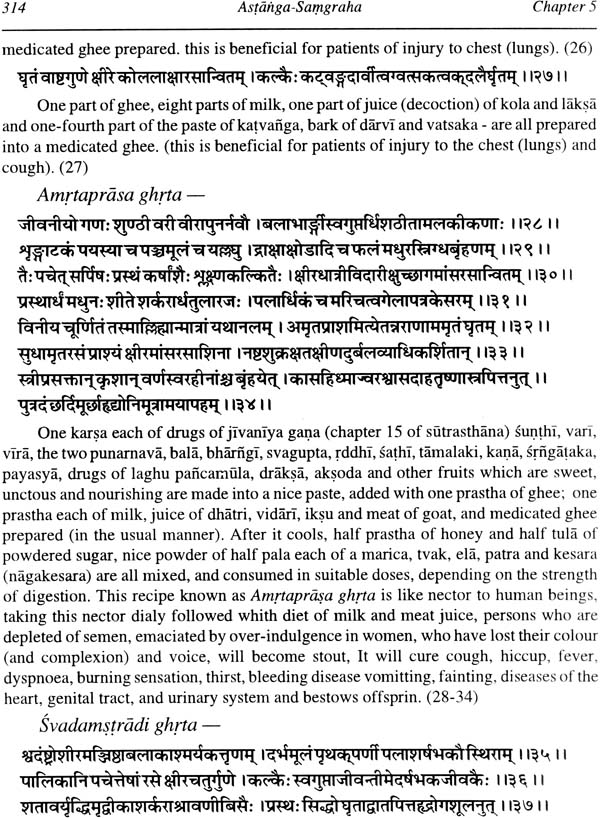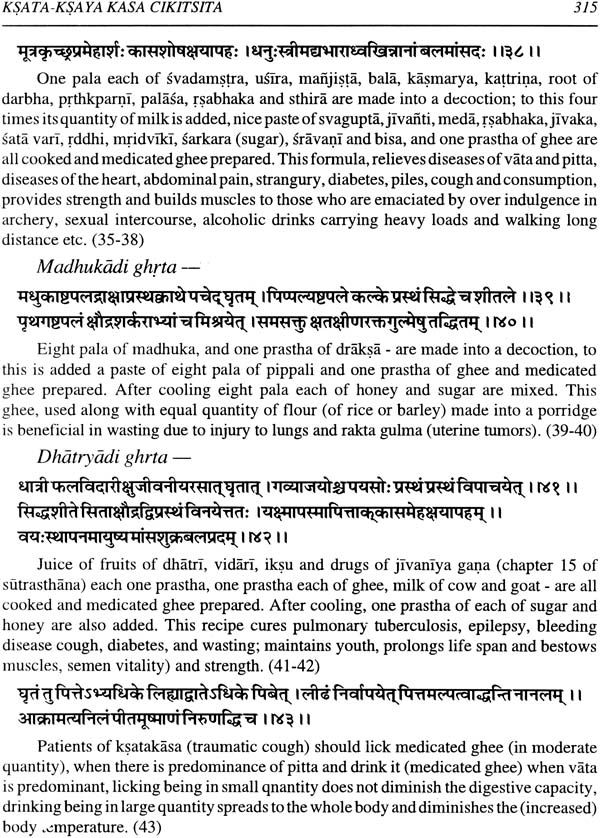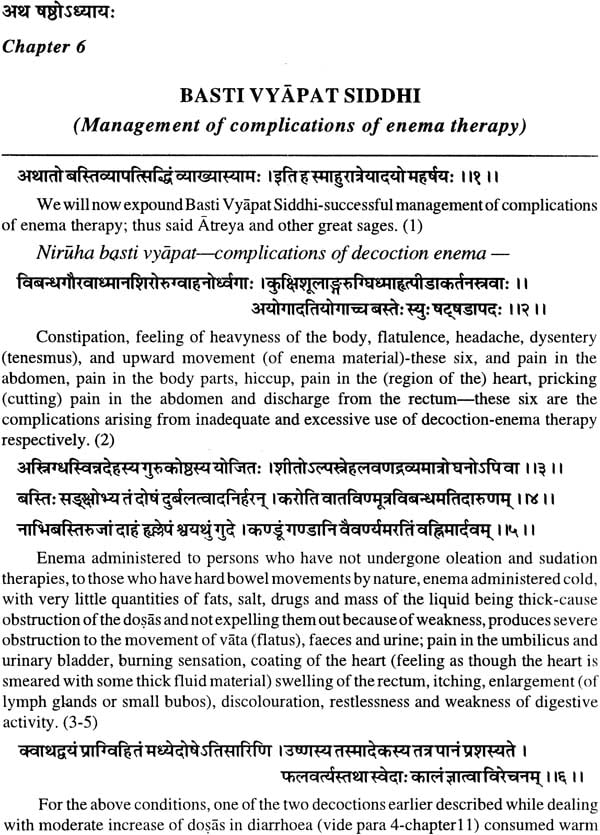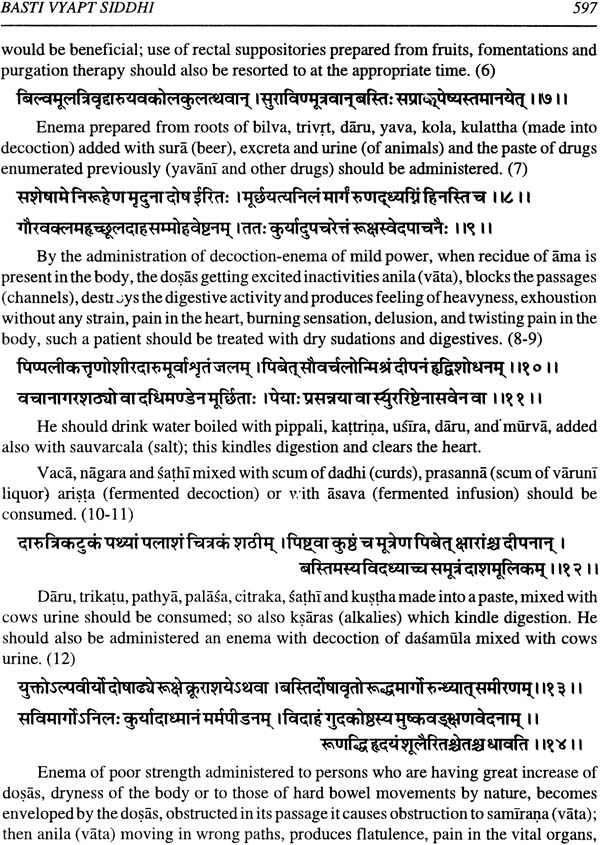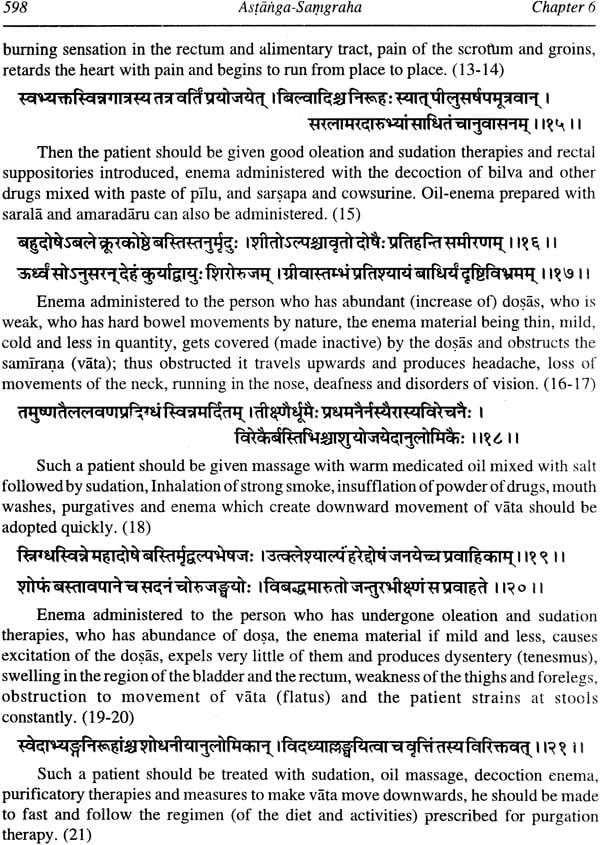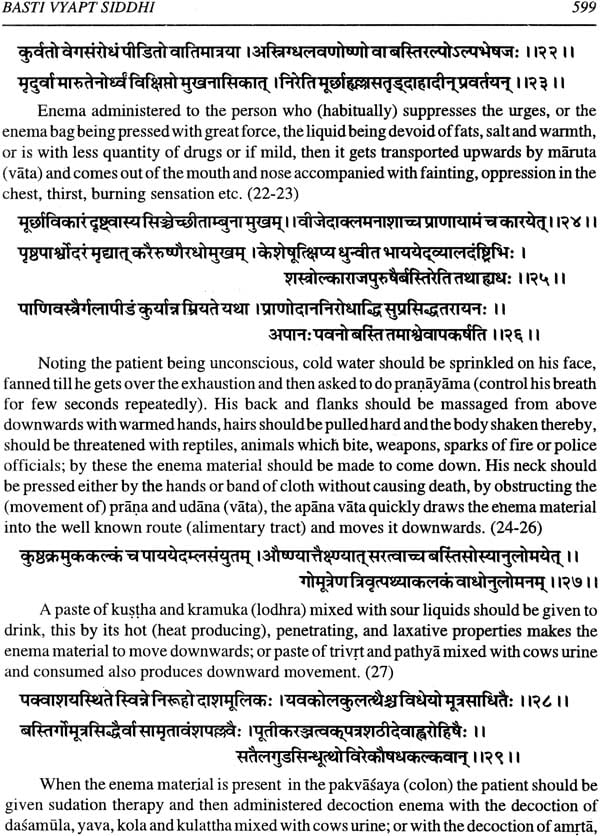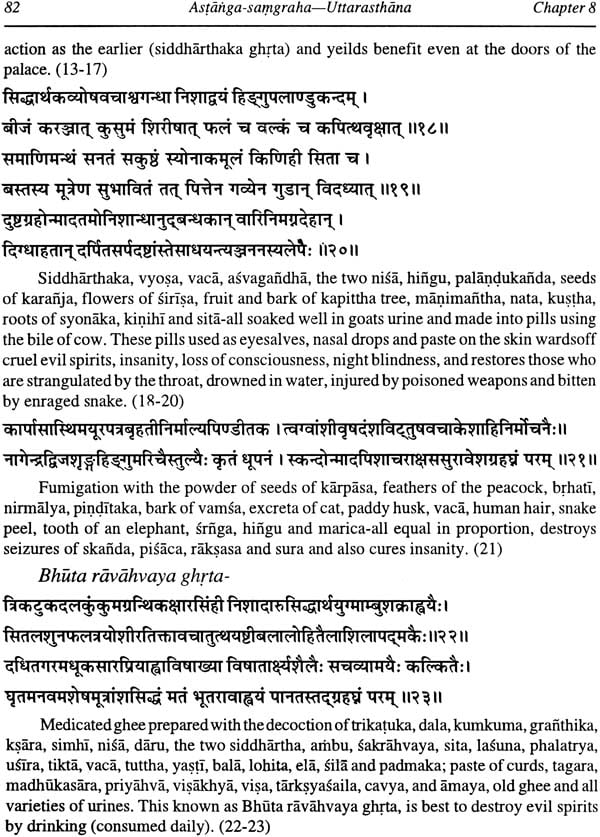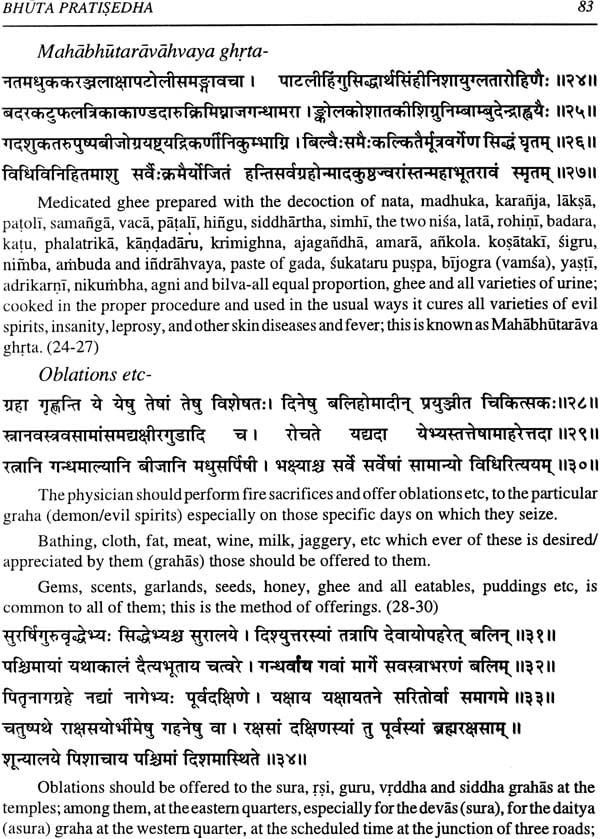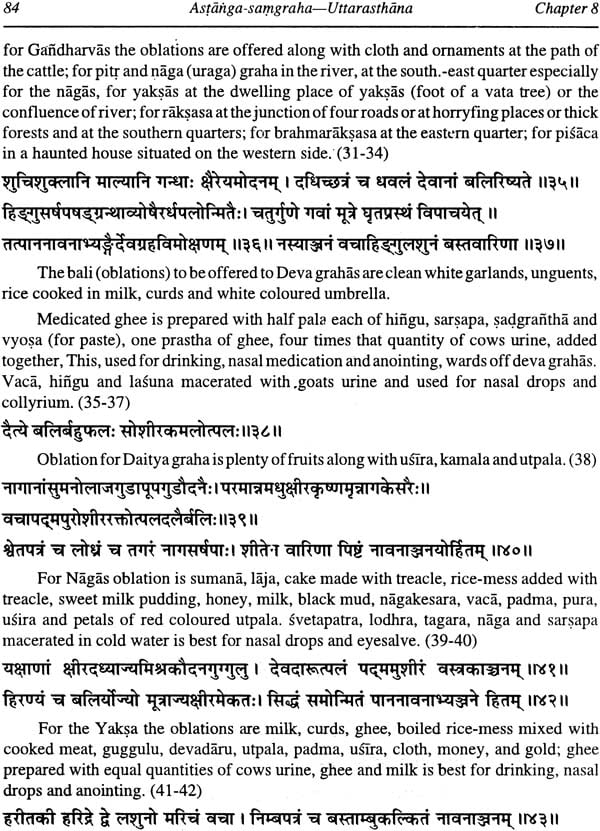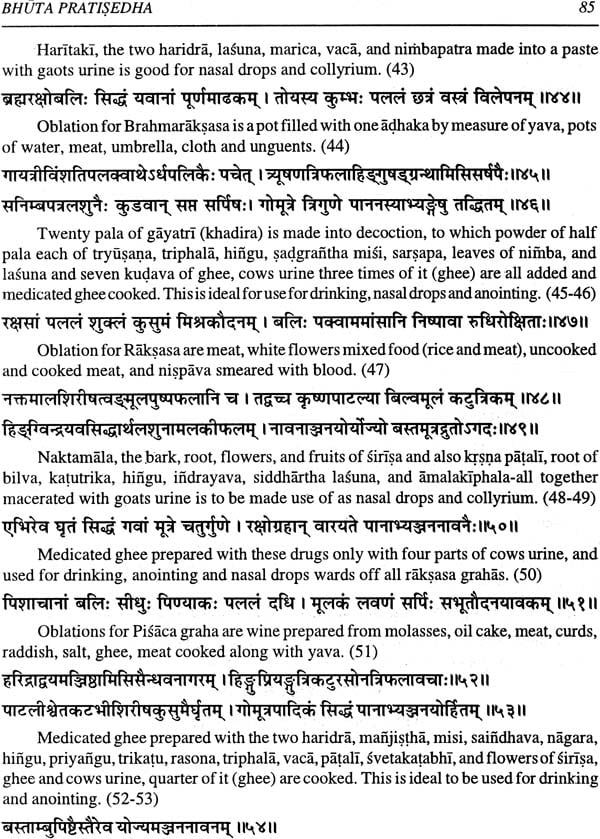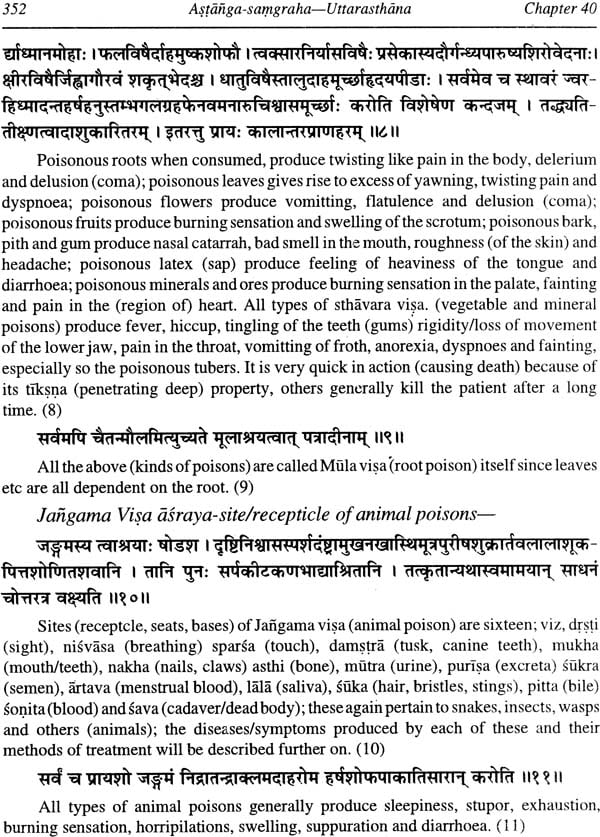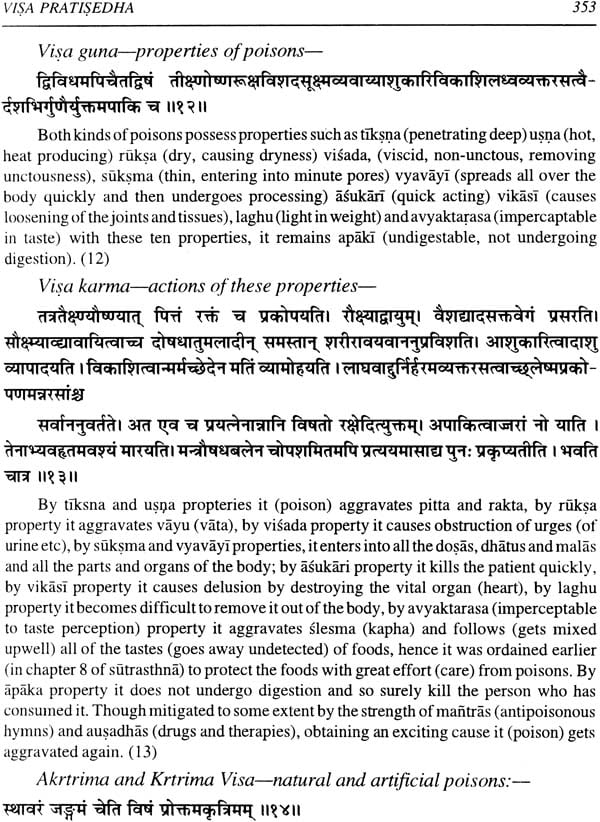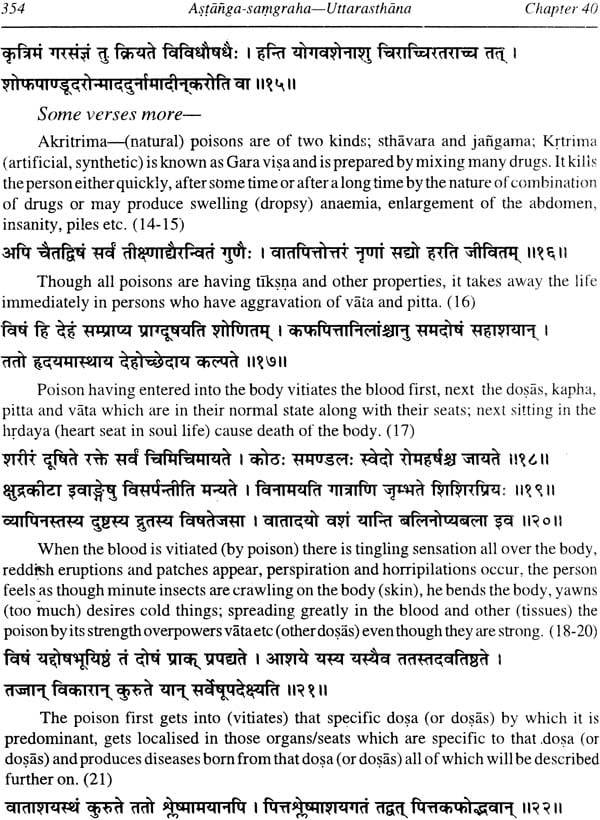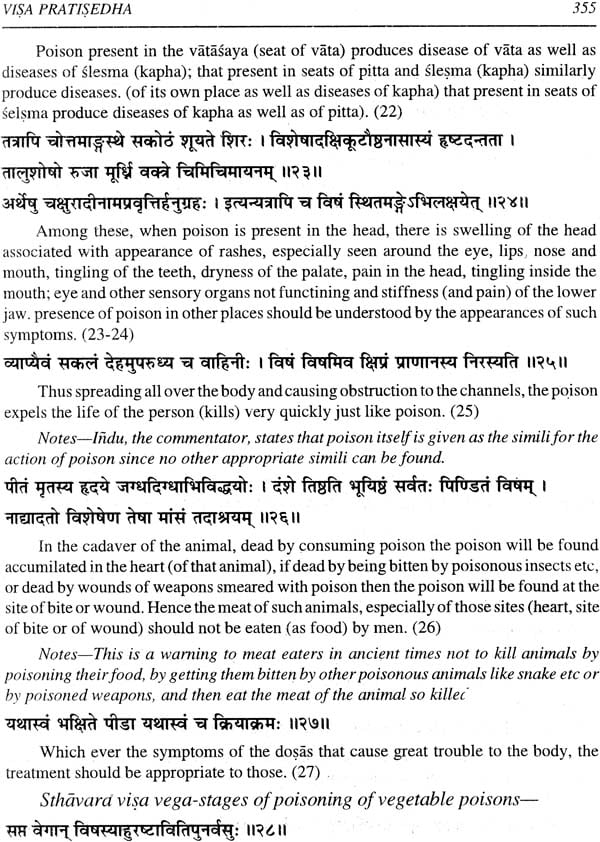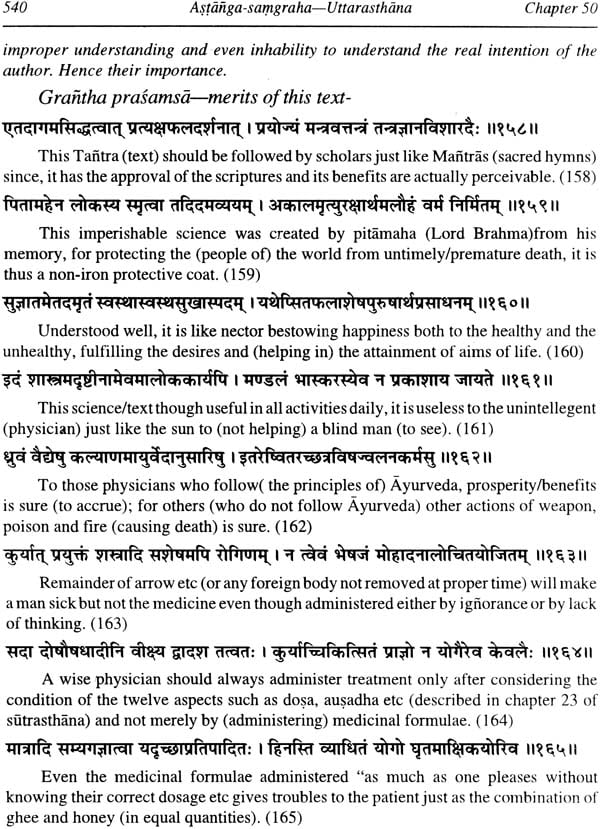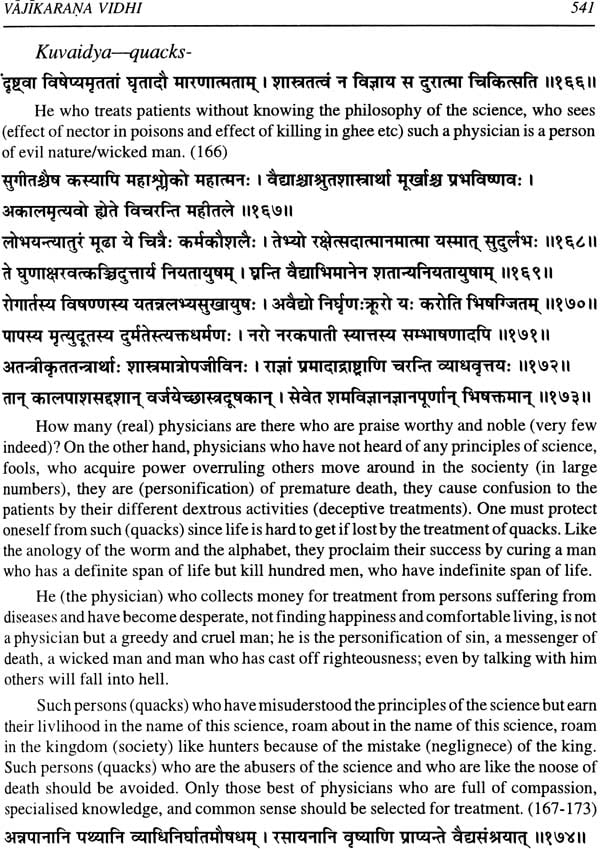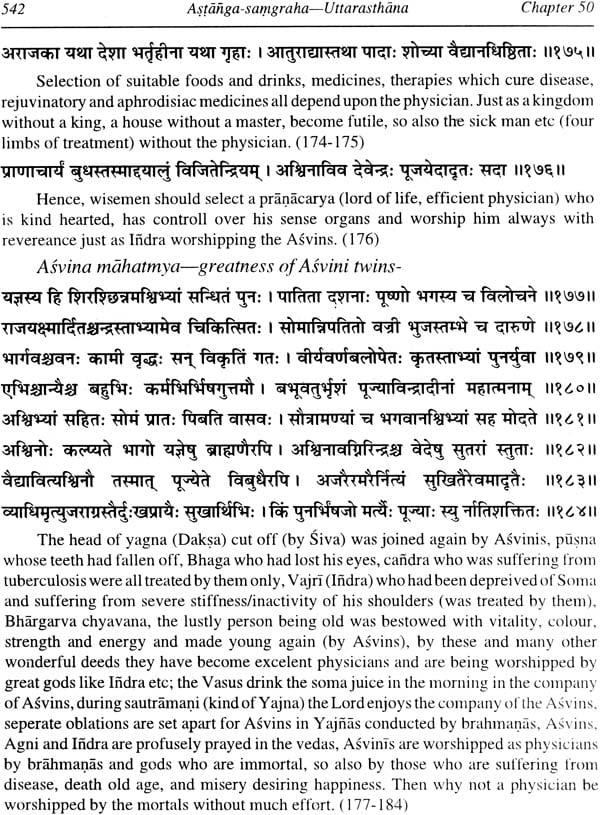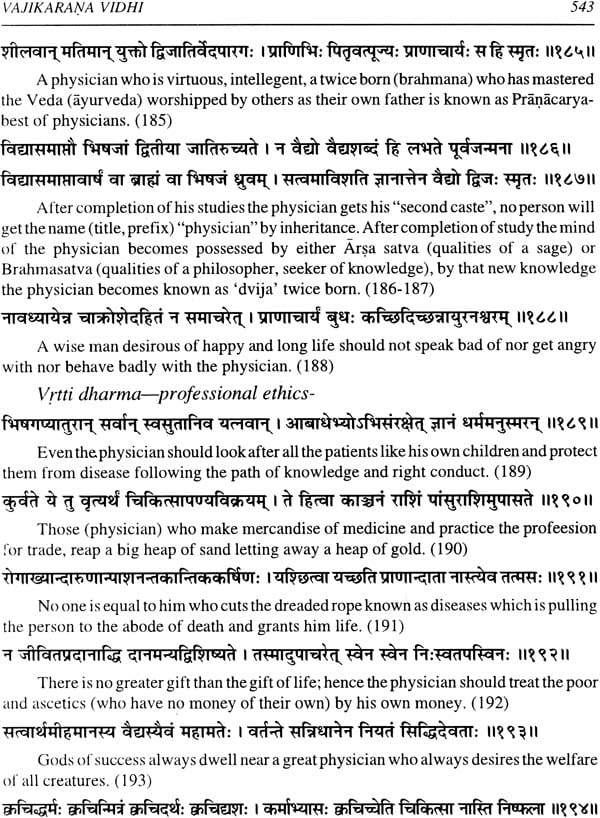![ASTANGA SAMGRAHA OF VAGBHATA (Three Volumes]](http://occultnthings.com/cdn/shop/products/idf428_{width}x.jpg?v=1678025228)
ASTANGA SAMGRAHA OF VAGBHATA (Three Volumes]
Book Specification
| Item Code: | IDF428 |
| Author: | Prof. K. R. Srikantha Murthy |
| Publisher: | CHAUKHAMBHA ORIENTALIA, Varanasi |
| Language: | Text, English Translation, Notes, Indeces etc[Three Volumes] |
| Edition: | 2016 |
| ISBN: | 9788176370202 (Set) |
| Pages: | 1951 |
| Cover: | Hardcover |
| Other Details | 10.0" X 7.4" |
| Weight | 3.65 kg |
Book Description
This book 'Astangasamgraha' of Acarya Vagbhata is an ancient authoritative text on Ayurveda, studied since many centuries by students, since many centuries by students, scholars and practitioners of Indian medicine. Because of its archaic style of composition and terse language certain amount of difficulty is being experienced. Desire for translation of the complete text either in Hindi or English is being keenly felt. This translation in English hopes to fulfil the need.
Translation has been done in simple English by Prof. K.R. Srikantha Murthy an experienced teacher and author. Explanatory notes have been added at many places to facilitate correct understanding especially by the students. Entire text is being covered in three volumes of translation, each one having Index, Appendices etc.
This being the first English translation of the complete text is sure to be of great help to all those interested in Ayurveda.
Prof. K. R. Srikantha Murthy (b. 1929) is an alumnus of the Govt. Ayurveda College, Mysore (1948) and Post-Graduate Center in Ayurveda, Jamnagar (1958). Served as professor and Principal at all the three Govt. Colleges of Ayurveda in Karnataka and retired in 1984. As ordained by his preceptor and mentor Prof. C. Dwarakanath, he has been pursuing literary research activities since last forty years and has many scientific monographs and books to his credit. He is the recipient of many titles prizes and awards from prestigious organizations.
This volume comprises of Sarira, Nidana, Cikitsita and Kalpa sthanas, the second, third, fourth and fifth sections of Astanga samgraha of Vagbhata.
As usual this also furnishes the text in original and its faithful translation in simple english.
I have dedicated this volume to Dr. V. Narayanaswamy, a bright luminary in the firmament of Ayurveda of the present day. A few words here about his life and accomplishments in life are needed to appreciate his calibre.
V. Narayanaswamy was born in 1903 and after his schooling, he joined the college of Indian medicine, Madras and passed out of it in 1929 obtaining H.P .I.M. He and Dr. C. Dwarkanath were classmates and students of the reputed teacher Capt. G. Srinivasa Murthy. He joined his almamater as lecturer (1930) and steadily rose to the highest office and retired as Head of the Dept. in 1958. All through this long period he devoted time for study, writing and research, produced many scientific monographs on various aspects of Ayurveda. He studied Siddha system of medicine also and wrote books on it. All these reflect his indepth study and clear elucidation of the subjects.
Realising the dire need of a good pharmacy to prepare genuine Ayurveda and Siddha medicines and make them available to the practtioners, he gathered a few of his like- minded friends and founded the Indian medical practioners co-operative pharmacy at Adyar, Madras in 1960 and served as the first President of its Board of Directors for nearly fifteen years (1960-75). He laid the firm foundation for its stability and development. Today, it is one of the major pharmacies being run on co-operative basis, manufacturing genuine medicines of Ayurveda, Siddha and Unani sy.stems, earning profit year after year. It stands as a monument to the foresight of Dr. V. Narayanaswamy.
He started a Research wing also in that pharmacy and the results achieved there prompted Govt. ofIndia to release financial grants to make it a full fledged independent organisation. Thus was born the Capt. O. Srinivasa Murthy Research Institute of Indian Medicine and its first director was none other than Dr. Narayanaswamy.
Considering his deep scholarship, zeal and enthusiasm to serve the cause of Ayurveda, many governments and universities appointed him as an expert member on Advisory committees. Govt. of India appointed him as member of the newly established Central council of Indian medicine. He was a member of almost all Advisory Boards set by central government. In the deleberations of all the Boards, his was the voice which fought valiantly for a rightful place for Ayurveda, improvements of the status of Indian systems of medicine in governmental set up, programmes for research activities etc. He is greatly responsible for implementation of many improvement schemes in the field of Indian medicine.
Considering the great qualities of his head and heart, President of India, granted him the award of "Padmasri" in 1974.
Now in his nineties, age has not dampened his intellect and enthusiasm, he continues as a source of guidance and inspiration for all.
Dedication of this volume is just a token of my respects to this great Ayurvedist. I pray Lord Dhanvantari to shower all his kindness on Dr. Narayanaswamy.
Ere concluding, I thank my daughter, Smt. K. S. Revathi. B.A. for her immaculate typing of the manuscripts. My sincere thanks are also due to, the proprietor and staff of Mis. Chowkhambha Orientalia, Varanasi for publishing these volumes.
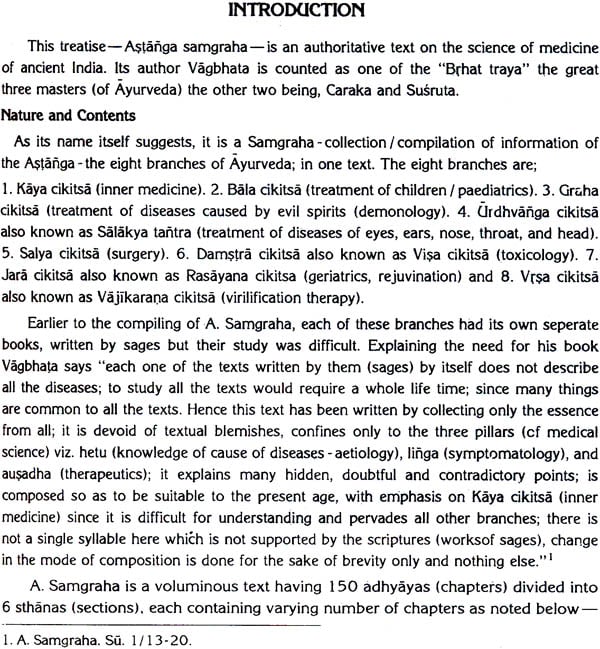
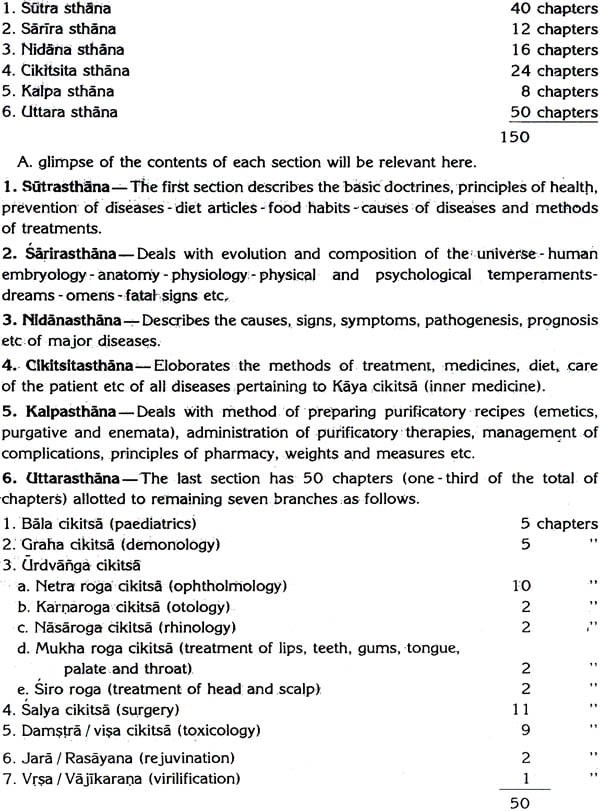
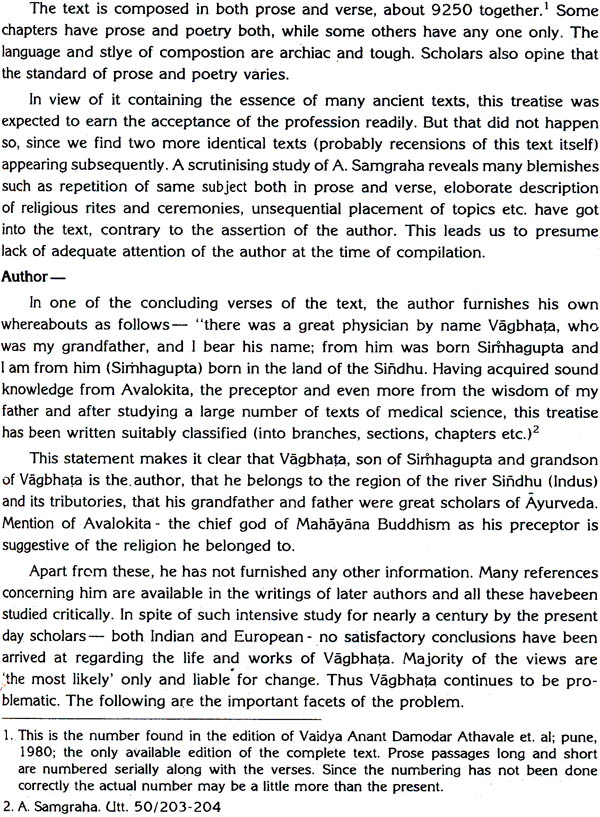
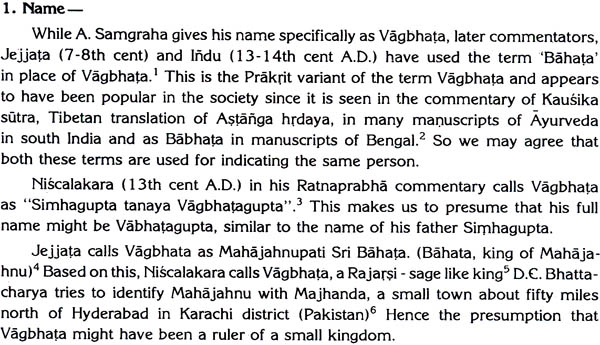

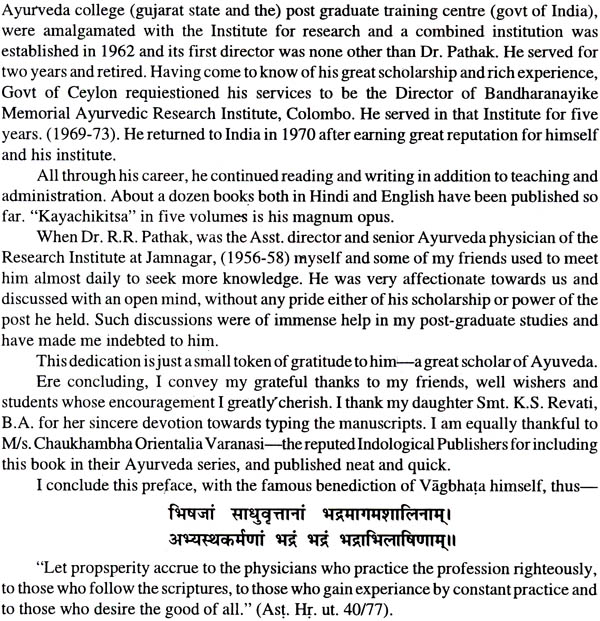
| I. | INTRODUCTION | 7 |
| II. | Chapters of the text | |
| Section-I. Sutrasthana | ||
| 1. | Desire for long life | 1 |
| 2. | Initiation of pupil | 23 |
| 3. | Daily regimen | 31 |
| 4. | Seasonal regimen | 57 |
| 5. | Prevention of diseases | 71 |
| 6. | Knowledge of liquid materials | 81 |
| 7. | Knowledge of diet articles | 115 |
| 8. | Protection of foods | 165 |
| 9. | Knowledge of incompatible foods | 197 |
| 10. | Regimen of diet | 226 |
| 11. | Proper quantity of food | 242 |
| 12. | Two kinds of therapies | 258 |
| 13. | Collection of best drug etc | 279 |
| 14. | Collection of purificatory drugs | 293 |
| 15. | Groups of efficient drugs | 300 |
| 16. | Different groups of drugs | 310 |
| 17. | Knowledge of substances etc | 319 |
| 18. | Classification of testes | 335 |
| 19. | Knowledge of dosas etc | 349 |
| 20. | Classification of dosas | 367 |
| 21. | Treatment of the dosas | 381 |
| 22. | Classification of diseases | 394 |
| 23. | Pre-requisites of treatment | 408 |
| 24. | Two kinds of therapies | 421 |
| 25. | Oleation therapy | 432 |
| 26. | Sudation therapy | 448 |
| 27. | Emesis and purgation therapies | 460 |
| 28. | Enema therapies | 485 |
| 29. | Nasal medication | 511 |
| 30. | Inhalation of smoke | 525 |
| 31. | Mouth gargles etc | 532 |
| 32. | Eye drops, collyrium therapy | 540 |
| 33. | Satiating the eye etc | 548 |
| 34. | Use of blunt and sharp instruments | 553 |
| 35. | Use of leeches | 571 |
| 36. | Venesection | 577 |
| 37. | Removal of foreign bodies | 590 |
| 38. | Surgical treatment | 601 |
| 39. | Preparation of caustic alkali | 617 |
| 40. | Thermal cautery therapy | 626 |
| Index | ||
| | ||
| i. | Foreword | |
| ii. | Chapters of the text | |
| section-ii - Sarira sthana | ||
| 1. | Desire for begetting a son | 2 |
| 2. | Formation of the foetus | 17 |
| 3. | Care of the pregnant women | 33 |
| 4. | Disorders of pregnancy | 44 |
| 5. | Human body and its parts | 58 |
| 6. | Classification of veins | 76 |
| 7. | Classification of vital spots | 90 |
| 8. | Kinds of human constitution | 98 |
| 9. | Knowledge of fatal signs | 111 |
| 10. | Knowledge of fatal signs | 117 |
| 11. | Fatal signs in disease | 121 |
| 12. | Knowledge of messenger etc | 129 |
| Section-iii -Nidana sthana | ||
| 1. | Diagnosis of diseases in general | 139 |
| 2. | Diagnosis of fevers | 148 |
| 3. | Diagnosis of bleeding diseases and cough | 162 |
| 4. | Diagnosis of dyspnoea and hiccup | 168 |
| 5. | Diagnosis of pulmonary tuberculosis etc | 173 |
| 6. | Diagnosis of alcoholism | 181 |
| 7. | Diagnosis of haemorrhoids/ piles | 187 |
| 8. | Diagnosis of diarrhoea and duodenal disease | 194 |
| 9. | Diagnosis of obstruction to micturition | 198 |
| 10. | Diagnosis of diabetes | 204 |
| 11. | Diagnosis of abscess, scrotal enlargement and abdominal tumor | 211 |
| 12. | Diagnosis of enlargement of the abdomen | 220 |
| 13. | Diagnosis of anaemia, dropsy and herpes | 226 |
| 14. | Diagnosis of leprosy, leucoderma and worms | 235 |
| 15. | Diagnosis of nervous disorders | 242 |
| 16. | Diagnosis of gout | 249 |
| Section iv. Ciditsita sthana | ||
| 1. | Treatment of fevers | 258 |
| 2. | Treatment of chronic fevers | 272 |
| 3. | Treatment of bleeding disease | 290 |
| 4. | Treatment of cough | 300 |
| 5. | Treatment of cough due to injury to lungs and tuberculosis | 311 |
| 6. | Treatment of dyspnoea and hiccup | 326 |
| 7. | Treatment of pulmonary tuberculosis | 335 |
| 8. | Treatment of vomiting, heart diseases and thirst | 350 |
| 9. | Treatment of alcoholic intoxication | 362 |
| 10. | Treatment of haemorrhoids / piles | 378 |
| 11. | Treatment of diarrhoea | 398 |
| 12. | Treatment of duodenal disorder | 409 |
| 13. | Treatment of retention of urine | 419 |
| 14. | Treatment of diabetes | 429 |
| 15. | Treatment of abscess and scrotal enlargement | 438 |
| 16. | Treatment of tumors of the abdomen | 445 |
| 17. | Treatment of enlargement of the abdomen | 459 |
| 18. | Treatment of anaemia | 472 |
| 19. | Treatment of dropsy | 481 |
| 20. | Treatment of herpes | 487 |
| 21. | Treatment of leprosy | 491 |
| 22. | Treatment of leucoderma and disease of worms | 512 |
| 23. | Treatment of nervous diseases | 520 |
| 24. | Treatment of gout | 538 |
| Section v. Kalpa sthana | ||
| 1. | Preparation of emetic recipes | 548 |
| 2. | Preparation f purgative recipes | 556 |
| 3. | Management of complications of emesis and purgative therapies | 568 |
| 4. | Preparation of enema recipes | 579 |
| 5. | Preparation of enemas of proven efficacy | 587 |
| 6. | Management of complications of enema therapy | 596 |
| 7. | Management of complications of oilenema therapy etc | 607 |
| 8. | Pharmaceutics | 615 |
| | ||
| I. | Preface | 3 |
| II. | Chapters of the text. | |
| Section. 6. Uttarasthana | ||
| 1. | Care of the new born baby | 1 |
| 2. | Treatment of diseases of children | 16 |
| 3. | Knowledge of evil spirits seizing children | 37 |
| 4. | Treatment of child seized by evil spirits | 43 |
| 5. | Procedure of purificatory bath | 50 |
| 6. | Treatment of different evil spirits | 58 |
| 7. | Knowledge of demons/evil spirits | 71 |
| 8. | Treatment of persons seized by demons | 80 |
| 9. | Treatment of insanity | 87 |
| 10. | Treatment of epilepsy | 96 |
| 11. | Knowledge of diseases of eyelids | 103 |
| 12. | Treatment of diseases of eyelids | 108 |
| 13. | Knowledge of diseases of fornices, sclera and cornea | 115 |
| 14. | Treatment of diseases of fornices, sclera and cornea | 121 |
| 15. | Knowledge of diseases of the pupil | 132 |
| 16. | Treatment of partial blindness | 137 |
| 17. | Treatment of total blindness | 149 |
| 18. | Knowledge of diseases of the whole eye | 157 |
| 19. | Treatment of ophthalmia | 160 |
| 20. | Treatment of ulcerations and chronic diseases of the eye | 174 |
| 21. | Knowledge of diseases of the ears | 181 |
| 22 | Treatment of diseases of the ears | 186 |
| 23. | Knowledge of diseases of the nose | 201 |
| 24. | Treatment of diseases of the nose | 205 |
| 25. | Knowledge of diseases of the mouth | 213 |
| 26. | Treatment of diseases of the mouth | 224 |
| 27. | Diseases of the head | 239 |
| 28. | Treatment of diseases of the head | 243 |
| 29. | Knowledge of different kinds of wounds | 256 |
| 30. | Treatment of wounds | 263 |
| 31. | Treatment of traumatic wounds | 276 |
| 32. | Treatment of fractures | 285 |
| 33. | Treatment of rectal fistula | 294 |
| 34. | Knowledge of benign and malignant tumors, filariasis, scrofula and sinus ulcer | 301 |
| 35. | Treatment of tumors etc | 305 |
| 36. | Knowledge of minor diseases | 315 |
| 37. | Treatment of minor diseases | 321 |
| 38. | Knowledge of diseases of genital organs | 327 |
| 39. | Treatment of diseases of genital organs | 335 |
| 40. | Treatment of poisons | 350 |
| 41. | Knowledge of snake bite poisoning | 375 |
| 42. | Treatment of snake bite poisoning | 390 |
| 43. | Treatment of insect bite poisoning | 404 |
| 44. | Treatment of spider bite poisoning | 415 |
| 45. | Treatment of different kinds of spiders | 425 |
| 46. | Treatment of rat bite and dog bite poisoning | 432 |
| 47. | Treatment of complications of poisoning | 441 |
| 48. | Administration of poisons in various diseases | 451 |
| 49. | Procedure of rejuvinatory therapy | 460 |
| 50. | Procedure of virilification therapy | 521 |
| III. | Appendices: | |
| Appendix No.-- | ||
| 1. | Persons and treatises mentioned as authorities. | 547 |
| 2. | Excerpts from Madhya Vagbhata (samhita) | 547 |
| 3. | Information about important religions | 551 |
| 4. | Geographical information | 552 |
| 5. | Anatomical and physiological information | 553 |
| 6. | Different kinds of therapies | 555 |
| 7. | Instruments and appliances | 559 |
| 8. | Articles of diet | 562 |
| 9. | Drugs-plants and plant products | |
| 1) Basonyms | 577 | |
| 2) synonyms | 581 | |
| 3) animal origin | 609 | |
| 4) poisonous animals | 619 | |
| 5) minerals, metals, salts, gems etc | 620 | |
| 10. | List of diseases | 623 |
| 11. | Medicinal formulae | 637 |
| 12. | Weights and measures | 640 |
| Select Bibliography- | 642 | |
| INDEX | 644 | |
